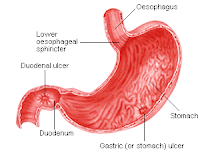Ulcers - Prevention and Relief

Doctors used to think that spicy foods and stress led to ulcers. While these factors may increase pain, experts now believe that most ulcers are due to:
- Bacteria; helicobacter pylori (H. pylori) weakens the stomach's protective mucosal coating, allowing acid to get through to the sensitive lining beneath.
- Common pain relievers: Frequent or long term use of nonsteroidal anti-inflammatory drugs (NSAIDs) such as aspirin, ibuprofen and naproxen can disrupt the stomach's ability to keep acid away from delicate tissue.
Many ulcers form and heal without ever becoming deep or large enough to cause pain. When they do make themselves known, the most common symptom is a dull, gnawing ache in the abdomen. Some people report greater pain when their stomach is empty. In some cases, you may see blood in your stool, or experience loss of appetite, bloating, nausea or vomiting.
Risk: Age is the biggest factor for bacteria-related ulcers: 50% of people 60 or older are infected with H. pylori, although the majority do not develop ulcers. You are at greater risk for developing NSAID-related ulcers if you:
Risk: Age is the biggest factor for bacteria-related ulcers: 50% of people 60 or older are infected with H. pylori, although the majority do not develop ulcers. You are at greater risk for developing NSAID-related ulcers if you:
- are age 60 or older;
- experience an upset stomach or heartburn after taking NSAIDs.
- take NSAIDs regularly or for a prolonged time period.
- have a history of internal bleeding or ulcers.
Alcohol, stress, caffeine, smoking and certain other medications may cause an ulcer to worsen or heal more slowly. A family history of ulcers may also increase your risk.
Tests Needed:
Tests Needed:
- a rectal exam tests for gastrointestinal bleeding.
- a blood, stool or breath test can determine the presence of H. pylori.
- an endoscopy allows the doctor to see whether H. pylori is present or ulcers have developed. While you are lightly sedated, a flexible tube attached to a tiny camera is passed down your throat and into your stomach and small intestine.
- x-rays can reveal signs of ulcers, such as inflammation or scarring.
Treatment and management: OTC drugs such as Tums and Mylanta contains calcium carbonate, which neutralizes stomach acid for fast relief. If there is no evidence of H. pylori infection, a prescription drug called a proton pump inhibitor can reduce the stomach's acid production, allowing ulcers to heal. If H. pylori is present, doctors recommend using antibiotics to kill the bacteria along with an acid suppressor or a stomach lining shield.
Comments